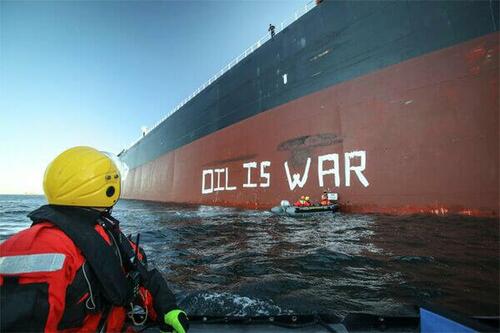
As part of the new 'imminent' sanctions on Russia - to include a phased ban on all Russian oil by the end of the year - it seems the European Union is ready to escalate even further, taking action to and beyond all-encompassing Iran-style sanctions.
Now it's mulling going after Russia's ability to even ship oil on the high seas with a proposed ban on European vessels and companies' ability to provide services to Russian shipping entities. As Bloomberg is reporting Wednesday, the action would constitute "a move that could dramatically impair Moscow’s ability to ship its oil anywhere in the world."

If such a ban on Russia's access to European insurers were enacted, this would leave Russian companies exposed to the tune of multiple billions of dollars every time a single tanker leaves port, given risks like accidents and oil spills can bring with it such a price tag in terms of claims and legal action.
Russian energy companies would then be left with few or no alternatives, writes Bloomberg: "While member states are still wrangling over the terms, it’s a potentially powerful tool because 95% of the world’s tanker liability cover is arranged through a London-based insurance organization called the International Group of P&I Clubs that has to heed European law."
The report makes direct comparison of such a course of action to a key way that Washington has for years been able to severely limit Iran's ability to transport of crude, forcing the Islamic Republic to cover its risks directly.
But huge hurdles still remain in terms of inter-EU unity on a Russian oil embargo, given the rise in countries demanding exemptions - led most notably by Hungary and Slovakia. And further erecting major hurdles for European companies is expected to be even more controversial given the ripple effect at home.
1) Sovcomflot fire-sales 1/3 of its 68 tankers to repay $2bn debt before 15 May sanction deadline;
— Alexander Stahel 🇺🇦 (@BurggrabenH) May 4, 2022
2) its highly regarded mgmt will have noticed the reduced need for Russian oil;
3) as well as the difficulty to ship without Western insurance…
https://t.co/9E2KPSBPaz
The ban would prevent any European entity or individuals from transporting Russian oil anywhere in the world, which will be particularly painful to the economies of smaller Mediterranean countries like Greece, Cyprus and Malta - which play an outsized role in the European shipping and transport industry.
These countries have reportedly already registered their opposition to such a drastic punitive plan, which they say will only blowback on European companies and their ability to do business.
As part of the new ‘imminent’ sanctions on Russia – to include a phased ban on all Russian oil by the end of the year – it seems the European Union is ready to escalate even further, taking action to and beyond all-encompassing Iran-style sanctions.
Now it’s mulling going after Russia’s ability to even ship oil on the high seas with a proposed ban on European vessels and companies’ ability to provide services to Russian shipping entities. As Bloomberg is reporting Wednesday, the action would constitute “a move that could dramatically impair Moscow’s ability to ship its oil anywhere in the world.”

If such a ban on Russia’s access to European insurers were enacted, this would leave Russian companies exposed to the tune of multiple billions of dollars every time a single tanker leaves port, given risks like accidents and oil spills can bring with it such a price tag in terms of claims and legal action.
Russian energy companies would then be left with few or no alternatives, writes Bloomberg: “While member states are still wrangling over the terms, it’s a potentially powerful tool because 95% of the world’s tanker liability cover is arranged through a London-based insurance organization called the International Group of P&I Clubs that has to heed European law.”
The report makes direct comparison of such a course of action to a key way that Washington has for years been able to severely limit Iran’s ability to transport of crude, forcing the Islamic Republic to cover its risks directly.
But huge hurdles still remain in terms of inter-EU unity on a Russian oil embargo, given the rise in countries demanding exemptions – led most notably by Hungary and Slovakia. And further erecting major hurdles for European companies is expected to be even more controversial given the ripple effect at home.
1) Sovcomflot fire-sales 1/3 of its 68 tankers to repay $2bn debt before 15 May sanction deadline;
2) its highly regarded mgmt will have noticed the reduced need for Russian oil;
3) as well as the difficulty to ship without Western insurance…
https://t.co/9E2KPSBPaz— Alexander Stahel 🇺🇦 (@BurggrabenH) May 4, 2022
The ban would prevent any European entity or individuals from transporting Russian oil anywhere in the world, which will be particularly painful to the economies of smaller Mediterranean countries like Greece, Cyprus and Malta – which play an outsized role in the European shipping and transport industry.
These countries have reportedly already registered their opposition to such a drastic punitive plan, which they say will only blowback on European companies and their ability to do business.







